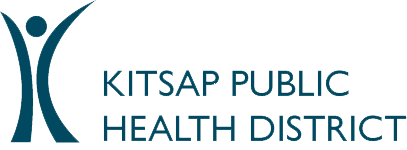
Actions Requested
- Review respiratory illness resources. The state Department of Health and partner agencies have assembled a list of resources that may be useful as you respond to high rates of respiratory illnesses in our community. These resources may be especially useful for facilities that do not routinely care for infants and children with respiratory illnesses who need higher acuity care. A list of these resources is included in the Background section of this advisory (below).
- Sign up to receive our Respiratory Illness Report. The report includes laboratory testing data for Kitsap County and data from hospital and hospital emergency room visits. The report is released weekly during flu season (September through May).
- Review a Dec. 9 public statement from Western Washington health officers and healthcare leaders urging increased precautions in response to the respiratory illness surge, including masking in indoor spaces and staying up to date on COVID-19 and flu vaccination.
- Consider attending an upcoming Pediatric Surge Q&A session: Below you can find information on an upcoming series of trainings/question and answer sessions that will be offered through Mary Bridge Children’s Hospital. They will have Mary Bridge ER, Med/Surg, and PICU Providers available to answer questions through a moderator for two of the sessions. Mary Bridge RNs, RTs, Child Life Specialists and IVT’s will be available to answer questions through a moderator for the other two sessions. There will be very short presentations followed by open Q&A sessions where outside facilities can ask their pediatric questions.
Sessions are labeled Session #1 and #2 – but both sessions have the same content and scope.
Monday, December 12, 2022 8:30am-10:00am (PST) Session #1 for RNs, Techs, CNAs, and RTs:
Microsoft Teams Meeting
Click here to join the meeting
Meeting ID: 240 163 698 56
Passcode: qr3pni
Join with a video conferencing device
Video Conference ID: 119 634 554 2
Or call in (audio only)
+1 253-292-9697,,936662863# United States, Tacoma
Phone Conference ID: 936 662 863# Find a local number | Reset PIN
Tuesday, December 13, 2022, 2:00pm-3:00pm (PST) Session #1 for Providers and APP (ER and inpatient):
Microsoft Teams Meeting
Click here to join the meeting
Meeting ID: 247 493 741 925
Passcode: ar5kgk
Join with a video conferencing device
Video Conference ID: 115 638 681 3
Or call in (audio only)
+1 253-292-9697,,321481680# United States, Tacoma
Phone Conference ID: 321 481 680#
Find a local number | Reset PIN
Monday, December 19, 2022, 11:00am-12:00pm (PST) Session #2 for Providers and APP (ER and inpatient):
Microsoft Teams Meeting
Click here to join the meeting
Meeting ID: 242 572 575 480
Passcode: PximJi
Join with a video conferencing device
Video Conference ID: 113 211 429 2
Or call in (audio only)
+1 253-292-9697,,806462706# United States, Tacoma
Phone Conference ID: 806 462 706#
Find a local number | Reset PIN
Wednesday, December 21, 2022 7:30am-9:00am (PST) Session #2 for RNs, Techs, CNAs, and RTs:
Microsoft Teams Meeting
Click here to join the meeting
Meeting ID: 227 654 353 477
Passcode: ReEJd9
Join with a video conferencing device
Video Conference ID: 116 076 197 9
Or call in (audio only)
+1 253-292-9697,,753732021# United States, Tacoma
Phone Conference ID: 753 732 021#
Find a local number | Reset PIN
Background
Respiratory Illness Resources for Providers
For general situation summary and guidance for healthcare partners, see CDC HAN on increased respiratory virus activity.
Resources Shared by Northwest Healthcare Response Network
- Pediatric Toolkit: https://nwhrn.org/pediatric-toolkit/
- Pediatric Resources: https://nwhrn.org/pediatric-resources/
- Pediatric Respiratory Surge Addendum: https://nwhrn.org/wp-content/uploads/2022/11/NWHRN-Pediatric-Respiratory-Surge-Operational-Framework-Addendum-Nov-2022.pdf
Resources Shared by REDI Coalition
- REDI HCC Situational Awareness: hcc@srhd.org
General Testing Guidance
CDC provides an algorithm for SARS-CoV-2 and influenza testing when both viruses are circulating. For patients who would benefit from antiviral treatment for influenza, early treatment is essential. As a result, empiric treatment may be preferable; influenza testing may not be necessary in the outpatient setting if it will not change clinical management. Given the lack of available treatment options, RSV testing may not be helpful in the outpatient setting if it will not change clinical management.
RSV Clinical Guidance
RSV usually causes a mild upper respiratory illness but can cause more serious lower respiratory tract disease in young children, older adults, or adults with chronic medical conditions. In young children, bronchiolitis is a common manifestation of lower respiratory tract disease. Pneumonia can also occur. While there are no directed treatments for RSV infection, eligible infants at higher risk of severe disease should receive palivizumab prophylaxis. The resources below provide further information on clinical management and prophylaxis.
- CDC provides general guidance on RSV for healthcare providers.
- The Seattle Children’s bronchiolitis pathway provides a protocol for the evaluation and treatment of bronchiolitis in young children; Mary Bridge Children’s Hospital provides a similar protocol (available in PDF form). The American Academy of Pediatrics (AAP) provides guidelines on diagnosis, management, and prevention of bronchiolitis.
- The AAP also provides guidance on the use of palivizumab prophylaxis.
Influenza Clinical Guidance
As noted above, for patients who would benefit from antiviral treatment for influenza, early treatment is essential. As a result, empiric treatment is often preferable, rather than waiting for influenza testing. The resources below provide guidance on influenza treatment for children and adults.
- CDC provides guidance for clinicians on influenza antiviral medications.
- AAP provides guidelines on influenza prevention and control in children, including information on antiviral treatment.
General Pediatric Respiratory Illness Guidance
AAP does not recommend routine use of antibiotics for viral respiratory illnesses and does not recommend cough and cold medicines be used in young children. See American Academy of Pediatrics Ten Things Physicians and Patients Should Question (recommendations 1 and 2).
Healthcare Surge Capacity Guidance
The resources below can help preparation and management of situations in which pediatric healthcare resources are strained.
- The AAP provides guidance on inpatient and outpatient care during episodes of surge.
- The National Pediatric Readiness Project ED Checklist and Toolkit can help emergency departments ensure high-quality care for children.
- A recent journal article provides practical advice on providing pediatric intensive care in adult medical intensive care settings.
- Western Regional Alliance for Pediatric Emergency Management (WRAP-EM) has compiled a “just in time” basic clinical guidance for respiratory care of children for providers with limited pediatric experience, including High-Flow Nasal Cannula (HFNC) Protocols.
- Massachusetts General Hospital and Region 1 RDHRS is sponsoring a series of 6 free on-line webinar training sessions. NOTE: these started 11/17/2022 however recordings of each session are posted to their YouTube and available for viewing.
Infection Prevention Guidance
Given the shared modes of transmission for respiratory viruses, the same infection prevention measures can help prevent transmission of multiple viruses. In all settings, COVID-19 vaccination, influenza vaccination, staying home when sick, mask use in crowded indoor settings, good hand hygiene, respiratory etiquette (i.e., covering coughs and sneezes), and routine surface cleaning can help to limit transmission. CDC provides specific guidance on reducing influenza transmission in schools, which may be helpful for K-12 school partners.
Information for Parents
The AAP’s HealthyChildren.org site provides a range of resources for parents, including a dedicated RSV page as well as a comparison of COVID-19, influenza, and RSV.
Information for Healthcare Providers
The number of influenza cases in Kitsap continues to be very high and rising.
- Nearly 10% of ED visits at SMMC were attributed to influenza-like illness (ILI) last week (week 47).
- For the past two weeks, SMMC has reported ~50 ILI-associated ED visits per week among pediatric patients (age <18 years); in October, the weekly average was 4.
- 35.5% of specimens tested by Kitsap sentinel labs were positive for influenza. Influenza A continues to dominate over influenza B.
Figure 1. Weekly ED visits attributable to ILI, age 0-17, past 102 weeks (2 years). Weeks with fewer than 10 ILI-attributable visits are suppressed and shown in grey.

Respiratory syncytial virus (RSV) remains high but appears to be leveling off in Kitsap County, and is decreasing in other parts of the state and nationally.
- 14.8% of specimens tested by Kitsap sentinel labs were positive for RSV.
The University of Washington Virology Pacific Northwest Respiratory Viral Epidemiology Data reflect increasing influenza cases over the past several weeks and decreasing, but still elevated, RSV and RHV cases.

Adult flu vaccine is still available for purchase. If you need help finding vaccine, visit Influenza Vaccine Availability Tracking System — IVATS – National Adult and Influenza Immunization Summit.
Contacting the Health District
- Call (360) 728-2235 and leave a message. Includes reporting notifiable conditions 24 hours a day, 7 days a week. Leave the patient’s name, date of birth and disease.
- Fax (360) 813-1168.
Additional Resources
- Respiratory Illness Update Reports, KPHD.
- Flu Overview, WA DOH.
- Weekly U.S. Influenza Surveillance Report, CDC.
- Seasonal Flu Vaccine Effectiveness Studies, CDC.
- Vaccine Locator, WA DOH.
- Vaccine Finder, CDC.
- The National Respiratory and Enteric Virus Surveillance System (NREVSS), CDC.
- Respiratory Syncytial Virus Infection (RSV) Provider Resources, CDC.
- Provider Resources, KPHD.
- Pacific Northwest Respiratory Viral Epidemiology Data, University of Washington Virology.
